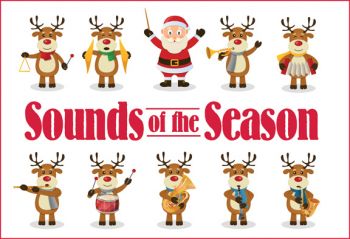Sounds of the Season: 12•16•18
A Christmas Festival, by Leroy Anderson
Composed by Leroy Anderson (1908–1975) in 1950, “A Christmas Festival” is an overture built on traditional holiday songs. Performed frequently by both wind and string ensembles, this piece is a prime example of the kind of music for which Anderson became famous. Many of Anderson’s works were premiered by the Boston Pops Orchestra under the direction of Arthur Fiedler. Fiedler’s successor, composer and conductor John Williams, described Anderson as “one of the great American masters of light orchestral music.”
Sleepers, Awake!, by J. S. Bach (arr. Alfred Reed)
Johann Sebastian Bach (1685–1750) based the text and music for “Sleepers, Awake!” on a Lutheran chorale. He composed two versions: a cantata in 1731 and an organ prelude in 1746. The hymn became well known among U.S. audiences after it was recorded by the Philadelphia Orchestra under the direction of Eugene Ormandy. The poignant work was arranged for concert band by Alfred Reed (1921–2005), one of the United States’ most prolific composers and arrangers.
There Shall a Star, by Félix Mendelssohn (trans. Mark J. Chelgren)
“There Shall a Star” is part of an unfinished oratorio by German Romantic composer Félix Mendelssohn (1809–1847). He began the work in 1846 at the suggestion of Christian Karl Josias von Bunsen, who compiled the German libretto from biblical sources. But Mendelssohn died the next year after completing only several sketches of movements. The unfinished work was published posthumously and given the title Christus by Mendelssohn’s brother. This setting of “There Shall a Star” is by Mark J. Chelgren, a long-time member of the Medalist trumpet section.
The Polar Express, by Alan Silvestri (arr. Jerry Brubaker)
This arrangement includes songs from the score of the 2004 film The Polar Express, based on Chris Van Allsburg’s award-winning children’s book. The music from the film, composed by Alan Silvestri and Glen Ballard, won the 2006 Grammy for best song written for a motion picture and was nominated in that category for an Oscar and a Golden Globe. Original songs from the score include “Believe,” “Hot Chocolate,” and the title track, “The Polar Express.” Composer and arranger Jerry Brubaker (b. 1946) has published more than 200 works for band, chorus, and orchestra. He is well known for his patriotic compositions and arrangements of popular music.
I Saw Three Ships, Traditional (arr. Stan Bann)
The earliest printed version of this traditional English carol is from the 1600s, but it is often associated with the Victorian era because it was included in a seasonal collection published in 1833. Scholars have offered several interpretations of the lyrics, which refer to three ships sailing into Bethlehem (a landlocked city). One interpretation is that the ships represent the camels used by the biblical Magi (the Three Wise Men), who brought gifts to the baby Jesus. This arrangement of the traditional carol is by Medalist’s principal trombone, Stan Bann.
Christmas Time Is Here, by Vince Guaraldi (arr. Stan Bann)
Vince Guaraldi (1928–1976), a jazz pianist and composer, wrote the musical scores for all 16 Peanuts television specials. The first song Guaraldi wrote for the Peanuts series was “Linus and Lucy,” which later became the signature theme of all the specials. Guaraldi composed “Christmas Time Is Here” in 1965 for A Charlie Brown Christmas. This arrangement of the modern Christmas classic is by Medalist member Stan Bann.
The Night Before Christmas, by Randol A. Bass
The poem “A Visit from St. Nicholas,” more commonly known as “The Night Before Christmas,” is attributed to Clement Clarke Moore (1779–1863). The verse was first published anonymously on December 22, 1823, in the Troy, New York, newspaper, and it was reprinted for several years before Moore claimed authorship. Moore’s verse—one of the most popular of all American poems—is considered the origin of the modern notion of Santa Claus. This musical version of the poem, by Randol A. Bass (b. 1953), was commissioned in 1988 by the Cleveland Symphony.
Tom Hegg, Guest Narrator
Intermission
The Christmas Song, by Mel Tormé and Robert Wells (arr. John Cacavas)
A holiday favorite, “The Christmas Song” was composed in 1944 in a collaboration between Mel Tormé (1925–1999) and Robert Wells (1922–1998). The duo reportedly wrote the piece in just 40 minutes on a sweltering summer day. Wells, best known as a lyricist, thought that he would “stay cool by thinking cool.” “The Christmas Song” is one of the most often performed holiday pieces; it has been recorded more than 1,700 times.
White Christmas, by Irving Berlin (arr. Zane Van Auken)
Several stories are told about how Irving Berlin (1888–1989) came to write “White Christmas,” a nostalgic tune that reminisces about an old-fashioned Christmas. According to one of the tales, Berlin wrote the piece in 1940 while sitting poolside at the Biltmore Hotel in Phoenix, Arizona. “White Christmas” was introduced in the 1942 film Holiday Inn and won the Oscar for best song that year. Today, the piece is considered the most often performed of all holiday songs.
Home for Christmas, by Seth Markham
In this medley, American arranger Seth Markham features three popular holiday tunes from the 1940s and 1950s. The first, “Let It Snow,” was composed in 1945 by Sammy Cahn and Jule Styne. This famous songwriting duo reportedly wrote the piece in Hollywood in July of that year on one of the hottest days on record. The second tune, “I’ll Be Home for Christmas,” was composed by Kim Gannon and Walter Kent and became a top-ten hit in 1943 when it was recorded by Bing Crosby. This melancholy song captures the point of view of a soldier writing a letter to his family while stationed overseas during World War II. The final tune, “Home for the Holidays,” was written by Robert Allen and Al Stillman in 1954. It, too, became a top-ten hit when recorded that year by Perry Como.
Winter Wonderland, by Felix Bernard and Dick Smith (arr. Paul Lavender)
“Winter Wonderland” was written by composer Felix Bernard (1897–1944) and lyricist Richard Smith (1901–1934), both of whom were from snowy Pennsylvania. Released in 1934, the piece was first recorded by Richard Himber and the Ritz-Carlton Hotel Orchestra. It became a hit, however, when it was recorded later that year by Guy Lombardo’s orchestra, and since then, it has been recorded by more than 150 artists.
Minor Alterations: Christmas Through the Looking Glass, by David Lovrien
Composer David Lovrien (b. 1963) morphs more than eight favorite holiday tunes, from “Deck the Halls” to The Nutcracker Suite, into something new and inventive—a little darker than most holiday music, perhaps, but still familiar and full of wonder. By transposing the tunes from major keys to minor keys, changing styles, and overlapping melodies, Lovrien gives each carol a completely new character. Alternately dramatic and funny, wistful and energetic, this medley is full of musical surprises.
Sleigh Ride, by Leroy Anderson
This holiday tune by Leroy Anderson (1908–1975) is perhaps his most well known. The idea for the composition came to Anderson during a heat wave in 1947, and he completed the piece in February 1948. A year later, Arthur Fiedler and the Boston Pops Orchestra first recorded the orchestral version, and it became an immediate hit. ASCAP reports that “Sleigh Ride” consistently makes the top-ten list of most-performed music worldwide during the Christmas season.
Program notes by Susan Freese
Upcoming Performances
Join our mailing list
Subscribe to our email newsletter to learn about upcoming concerts.


